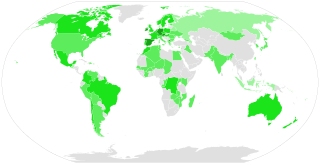
A green party is a formally organized political party based on the principles of green politics, such as social justice, environmentalism and nonviolence.
The New Zealand Labour Party, also known as Labour, is a centre-left political party in New Zealand. The party's platform programme describes its founding principle as democratic socialism, while observers describe Labour as social-democratic and pragmatic in practice. The party participates in the international Progressive Alliance. It is one of two major political parties in New Zealand, alongside its traditional rival, the National Party.
The New Zealand National Party, shortened to National or the Nats, is a centre-right political party in New Zealand. It is one of two major parties that dominate contemporary New Zealand politics, alongside its traditional rival, the Labour Party.

The Christian Heritage Party of New Zealand was a New Zealand political party espousing Christian values and conservative views on social policy. Although it never won seats in an election, it came close to doing so in 1996 as part of the Christian Coalition and briefly had a member in Parliament.

ACT New Zealand, also known as the ACT Party or simply ACT, is a right-wing, classical-liberal political party in New Zealand. Young ACT is an associated student wing.
New Zealand First, commonly abbreviated to NZ First, is a populist and nationalist political party in New Zealand. The party formed in July 1993 following the resignation on 19 March 1993 of its leader and founder, Winston Peters, from the then-governing National Party. Peters had been the sitting Member of Parliament for Tauranga since 1984 and would use the electorate as the base for New Zealand First until consecutive defeats by National Party candidates in 2005 and 2008. His party has formed coalition governments with both major political parties in New Zealand: first with the National Party from 1996 to 1998 and then with the Labour Party from 2005 to 2008 and from 2017 to 2020. Peters has served on two occasions as deputy prime minister.
The Alliance was a left-wing political party in New Zealand. It was formed at the end of 1991 by the linking of four smaller parties. The Alliance positioned itself as a democratic socialist alternative to the centre-left New Zealand Labour Party. It was influential throughout the 1990s, but suffered a major setback after its founder and leader, Jim Anderton, left the party in 2002, taking with him several of its members of parliament (MPs). After the remaining MPs lost their seats in the 2002 general election, some commentators predicted the demise of the party.

The 2002 New Zealand general election was held on 27 July 2002 to determine the composition of the 47th New Zealand Parliament. It saw the reelection of Helen Clark's Labour Party government, as well as the worst-ever performance by the opposition National Party.

The 1999 New Zealand general election was held on 27 November 1999 to determine the composition of the 46th New Zealand Parliament. The governing National Party, led by Prime Minister Jenny Shipley, was defeated, being replaced by a coalition of Helen Clark's Labour Party and the smaller Alliance. This marked an end to nine years of the Fourth National Government, and the beginning of the Fifth Labour Government which would govern for nine years in turn, until its loss to the National Party in the 2008 general election. It was the first New Zealand election where both major parties had female leaders.
Jim Anderton's Progressive Party was a New Zealand political party to the political left of its ally, the Labour Party.
United Future New Zealand, usually known as United Future, was a centrist political party in New Zealand. The party was in government between 2005 and 2017, first alongside Labour (2005–2008) and then supporting National (2008–2017).

The New Zealand Social Credit Party was a political party that was New Zealand's third party from the 1950s to the 1980s. It was elected to the New Zealand House of Representatives, holding one seat at times between 1966 and 1981, and two seats from 1981 to 1987. It was named the New Zealand Democratic Party from 1985 to 2018, and was part of the Alliance party from 1991 to 2002. It returned to the Social Credit name in 2018. The party deregistered itself in early 2023.

The McGillicuddy Serious Party (McGSP) was a satirical political party in New Zealand in the late 20th century. Between 1984 and 1999, it provided "colour" to ensure that citizens not take the political process too seriously. The party's logo, the head of a medieval court jester, indicated its status as a joke party.

Aotearoa Legalise Cannabis Party (ALCP), also known as the Cannabis Party, is a political party in New Zealand. It is dedicated to the legalisation of cannabis for medical, recreational and industrial use. It was founded in 1998 and has stood in every general election since, but has never won representation in Parliament. Several of its members have gone on to political success after leaving the party.

Mauri Pacific was a short-lived political party in New Zealand. It was formed in 1998 by five former members of the New Zealand First party. It has often been described as a Māori party. Officially, Mauri Pacific was a multiculturalist party, welcoming anyone who supported racial and cultural harmony. Three of its five MPs were Māori, and two were Pākehā.
NMP was a political organisation in New Zealand in the late 1990s and early 2000s. It contested two general elections but won no seats.

The 1966 New Zealand general election was a nationwide vote to determine the shape of the New Zealand Parliament's 35th term. It saw the governing National Party win a third consecutive term in office. It was also the first time since the 1943 election that a minor party won a seat in Parliament.
The New Zealand Republican Party of 1995 was a political party which campaigned for the creation of a New Zealand republic as one of its main policies. It existed from 1995 to 2002.

Northcote is a New Zealand parliamentary electorate, returning one member of parliament to the New Zealand House of Representatives. Currently, the Member for Northcote is Dan Bidois of the National Party, who won the seat at the 2023 election.
Heartland New Zealand is a New Zealand political party founded in 2020. The party is rural-based, and opposed the New Zealand Emissions Trading Scheme, the Paris Agreement, and attempts to limit the environmental impacts of agriculture.









